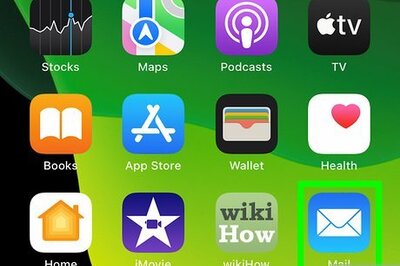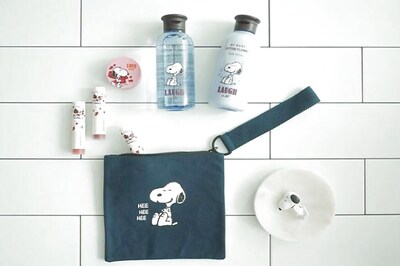
views
Eating and Speaking Guidance

Avoid sweet foods and drinks between meals. The sugar in sweet foods and drinks, like candy or juice, can damage your teeth. Since you should brush after each meal, it is alright to eat sweet foods during meals. You should also avoid sticky treats, like toffee or chewing gum, which can damage the twin blocks.

Avoid hard foods at first. When you first receive your twin block braces, your mouth and jaw will be sore. This discomfort will likely last for a few days and can be aggravated by eating hard or crunchy foods like apples. Stick to soft foods, like mashed potatoes or yogurt, until your discomfort goes away. Colder drinks, like a smoothie or chilled juice, may help to soothe pain. Hard or crunchy foods, like popcorn, pretzels, or chips, can break and become lodged under your block braces. You can either avoid these foods or only eat them when your block braces are taken out.

Keep your braces in while eating, if possible. Ideally, you will feel comfortable eating and drinking with your braces in at all times. The longer you are able to wear your braces for each day, the shorter your treatment time will be. When you just receive your twin block braces, you can take them out to eat meals. Over time, as you get more comfortable wearing the braces, try to keep them in while you eat meals. Keep them in a plastic box for safekeeping while you are eating if you need to take the braces out.

Practice speaking with your braces. It is fairly common to notice differences in your speech while you're wearing twin block braces. Often, your speech patterns will go back to normal after a few weeks but you can speed up this process by practicing speaking with the braces in. You may also produce more saliva than normal, though this will stop after a few days. Read aloud while you're at home and practice tongue twisters to get used to forming words with your braces in. “S” sounds tend to be the most affected, so practice tongue twisters like “She sells sea shells down the sea shore.”
Pain Management & Prevention

Treat canker sores. Canker sores tend to appear near the metal parts of the twin block braces where they irritate the skin. These are the most common type of mouth ulcer and it's very likely that you'll get one at some point during your orthodontic treatment. They typically last 10 to 14 days and can be treated with over the counter remedies. Look for products that temporarily numb the area to bring some short-term relief. You can also rinse your mouth with warm salt water, which helps to ease oral irritations. Be sure not to swallow the salt water after rinsing. You can look for products at drug stores that are specifically intended for mouth ulcers, or for products that contain oral antiseptics, like carbamide peroxide, that will kill bacteria. If you frequently get canker sores, talk to your orthodontist about whether a prescription-strength product is right for you.

Make or buy a dental kit. A dental kit will contain supplies that will help you clean and care for your twin block braces while you're on the go. You can keep a dental kit in your car, purse, briefcase, or backpack. Your dental kit should include: A travel or full-size toothbrush Travel size toothpaste Dental wax Dental floss or interdental picks A small spiral dental brush. You may have to ask your orthodontist for one of these brushes. You can find a dental kit at a large retailer or a drug store if you don't want to make your own.

Alleviate pain. You may experience pain or discomfort after your braces have been adjusted. With most block braces, your orthodontist will either instruct you to turn a key on the top brace or they will do it for you during an appointment. This key expands the top brace and will be adjusted as your jaw moves into the correct alignment. This can be uncomfortable, or even painful. Depending on your specific treatment, your bottom brace could be adjusted periodically. After your top or bottom brace has been adjusted, eat soft foods and avoid any hard foods. An ice pack can help alleviate jaw pain, or you can take an over the counter pain medication.

Recognize orthodontic emergencies. Discomfort is a normal part of the twin block treatment process, but there are situations where pain could indicate that there is a problem with your braces. If a brace is ever broken or bent, call your orthodontist and schedule an appointment as soon as possible. If you are dealing with severe pain, consider talking to your doctor about pain management medications. If you ever lose one of your braces, make an appointment with your orthodontist as soon as possible.
Advice for Living with Twin Block Braces

Be prepared for potentially embarrassing situations. One of the most common sources of embarrassment with block braces is having food caught in the brace. You can prevent this problem by carrying a dental kit with you. This kit will help you to remove any food that's caught and keep your teeth clean. Drinking plenty of water can help to prevent food from getting caught by washing it away. Practicing speaking with your braces in can also help to prevent any potentially embarrassing speech problems.

Remember that braces aren't stigmatized. The fact is, most people will eventually have some sort of orthodontic treatment during their lifetime. If you're the only person you know with block braces, just remember that down the line the people who don't have braces now will likely have them in the future. You probably know other people who have braces, which can also help you stop feeling embarrassed by knowing others are going through the same thing. Keep in mind that others aren't nearly as focused on your braces as you are. If you're feeling self-conscious, remember that the majority of people are so wrapped up in their own lives and problems that they won't notice your braces.

Stay focussed on the outcomes. The ultimate goal of your orthodontic treatment is to have a healthy and aligned jaw. Block braces can be uncomfortable and feel burdensome, but they are a necessary part in this process. Whenever you're feeling down about your situation, or you feel embarrassed about your situation, remember that the final product is worth it. Keep your orthodontic goal in mind by looking at before and after pictures from other people who have had block braces. Your orthodontist will have pictures of other peoples' treatments, and you can find before and after shots online.
Caring for Your Braces

Wear both braces, never just one. Twin blocks are an orthodontic treatment used to correct jaw alignment, especially overly protruding upper front teeth. They push the lower jaw out so the upper jaw and the lower jaw are in line. They're usually used with kids and teens whose bones are still growing and developing. You have to wear both braces at all times, otherwise they won't be able to adjust your jaw properly.

Wear your twin blocks for at least 18 hours a day. Twin blocks should be worn every day for at least 18 hours a day. If possible, you can wear your block braces for 24 hours a day. Most people will need to take the block braces out to eat when they first receive them, or after they are adjusted. You can take your braces out while you're playing contact sports, or when you play a wind instrument. You should always wear a mouthguard during sports, even if you take your braces out.

Clean your teeth. You need the keep your teeth and gums very clean, otherwise you risk damaging them permanently with the block braces. Besides brushing your teeth each morning and night, you should brush after meals. You can use either a manual or an electric toothbrush in conjunction with fluoride toothpaste. Use floss to clean between teeth and to keep your gums healthy. You can also rinse with a non-alcoholic mouthwash. Alcohols can erode your braces, so avoid alcoholic mouthwashes.

Brush the block braces between meals. You will need to remove each brace when you are having a meal. After you remove the braces, rinse them under a running tap and clean it with a toothbrush. Do not use toothpaste to clean the braces, since the chemicals in toothpaste can be damaging to the brace material. You will need to clean your teeth before you re-insert the brace so food is not trapped between the brace and your teeth.

Soak the braces in a retainer cleaning solution. While brushing will help to remove larger food particles, you will need to soak your braces in a retainer cleaning solution to kill remaining bacteria. You should soak it at least once a week, but you can soak it more frequently. You can use a denture cleaner, brush it with a baking soda and water paste, or clean it with an antibacterial dish soap. Be sure the rinse the braces thoroughly after soaking them.




















Comments
0 comment